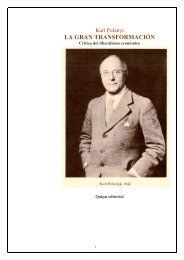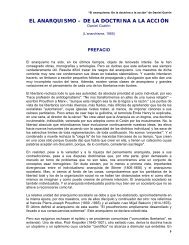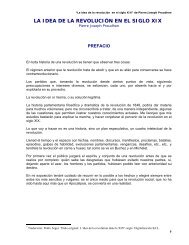444 <strong>La</strong> lógica <strong>de</strong> <strong>la</strong> investigación científica Fórmu<strong>la</strong>s <strong>de</strong> Heisenberg, véase Heisenberg, fórmu<strong>la</strong>s <strong>de</strong>. Frecuencia, véase Probabilidad. Frecuencia media, 173(,n, 174,n, 175, 176,n, 274. Frecuencia re<strong>la</strong>tiva, 137,/i, 140,n, 146, 155, 274, 336. Véanse también Aleatoriedad; Secue<strong>la</strong>s; Segmentos; Selección; Sucesiones. Frecuencia re<strong>la</strong>tiva, axioma <strong>de</strong> aleatoriedad <strong>de</strong> <strong>la</strong> (o <strong>de</strong> exclusión <strong>de</strong> los sistemas <strong>de</strong> jugar), 142t-143í, 144-145, 157, apartado 58, 159M62, 177n, 181, 182- 183,n; modificación <strong>de</strong>l —•, 144-145,n, 155rt, 160n, 171, 173-177,n, 335-336. Frecuencia re<strong>la</strong>tiva, axioma <strong>de</strong> convergencia o <strong>de</strong> límite <strong>de</strong> <strong>la</strong>, 143í, 144-145, 155-156, 157-158, 170-173, 182-183,n,- modificación <strong>de</strong>l — (substituyéndolo por el requisito <strong>de</strong> unicidad), 142, 144- 145, 155n, 171,fi-172, apartado 64, 173- 177,n, 181,«, 182-183,re; superfluidad <strong>de</strong>l —, 171«, 175n, 179n, 186n, 273n, 336. Frecuencia re<strong>la</strong>tivr., axiomas <strong>de</strong> Von Mises para <strong>la</strong>, 137, apartado 50, 142, 143t- 14+. 160, 172, 176-177; compatibiHdad o coherencia <strong>de</strong> los —; 159-160, 177n, 3?6; críticas suscitadas contra los —, 144-145, apartado 58, 159-162, 177n,- in<strong>de</strong>pen<strong>de</strong>ncia <strong>de</strong> los —, 170-171, 274; modificación <strong>de</strong> los —, apartado 51, 144-145, 170-172, 176-177. Frecuencia re<strong>la</strong>tiva; — <strong>de</strong> c<strong>la</strong>ses finitas (F"), 145t-147, 162-163, 171, apéndice II, 267-269; — <strong>de</strong> segmentos <strong>de</strong> sucesiones finitas (F'), 145t, 155í, 156, 163, 174; — <strong>de</strong> sucesiones aleatorias infinitas (F), 146n, i62í, 163, 171-172, 173, 199, 274; — <strong>de</strong> sucesiones finitas, 149-153, 162-163, 172. Frecuencia veritativ;-,, 238t,nl, 239,n, 240,n-242, 293-294. Función veritativa, 121n, 266, 291. GENERALIZACIÓN. 66.it, 83ra, 102, 130, 157-158, 252-253, 254, 290, 394-395, 408. Véanse también Inducción; Nombres, universales; Universales, el problema <strong>de</strong> los; Universales, enunciados. Geometría, 69, 71, 125-127, apartado 45, 135-136, 292re, 377. Gravitación: corroborarión <strong>de</strong> <strong>la</strong>s teorías <strong>de</strong> Einstein y <strong>de</strong> Newton, 373ra. HECHOS, 57, 71,ra, 72, •83,ra-84, 90, 91- 92, 93, 10.'í,ra, 395, 396. Heisenberg, fórmu<strong>la</strong>s <strong>de</strong>, 201, 204, 205, 206, 209,n.210, 21.>. 213, 221, 232, 279; carácter positivista <strong>de</strong> <strong>la</strong>s —, 204- 205.n, 206, 216-217, 218, 231, 232, 278n, 279, 420-422, 427, véase también Heisenberg, programa <strong>de</strong>; interpretación <strong>de</strong> propensiones <strong>de</strong> <strong>la</strong>s —, 210n, 212n, 217n, interpretación estadística <strong>de</strong> <strong>la</strong>s —, 201, 202, 209, 210-212, 213- 214, 215, 219, 220-221, 229, 421, 426,ra, véase también Re<strong>la</strong>ciones estadísticas <strong>de</strong> dispersión; interpretación ortodoxa <strong>de</strong> <strong>la</strong>s —, 201, 202, 203-207, 208-209,n, 213, 214-215, 220-221, 229, 275-277, 278,ra, 279, 414,ra.415, 416, 417-418, 420-421, 422, 427, véase también Imaginario, experimento; interpretación provisional <strong>de</strong> Schródinger <strong>de</strong> <strong>la</strong>s.—, 218; (<strong>la</strong>s) — requieren hipótesis auxiliares y ad hoc, 222,ra-223, 416, 417. Heisenberg, programa <strong>de</strong>, apartado 73, 203-207, 213, 214, 215-216, 231,n.232, 422. Heurístico, 124, 300-302, 413. Hipótesis; — ad hoc, 41, 68, 78-79, 136, 253ra, 342; — auxiliares, 41, 79-80, 136', 255; <strong>de</strong>cidibilidad <strong>de</strong> —, véase este epígrafe; — estadísticas (estimaciones frecuenciales estadísticas o extrapo<strong>la</strong>ciones estadísticas), apartado 57, 155re, 157- 158,n, 159, 168, 169n, 172, 173-174, 180-182, 190-192, 193-194, 195, 197, 230, 243, 274, 341-342, 359n, 381, 384- 385, 387-388, véanse también Distribución; Equidistribución; — existencia- Íes, 180, 181Í-183; — falsadoras y <strong>de</strong> bajo nivel, 72, 83,ra, 106; — universal-existenciales, 180,ra-181f. Hipotético, carácter <strong>de</strong> los enunciados científicos, 27, 28, 29-30, 52-53, 69, 70, 71, 72, 74, 135, 209n, 216, 230, 235-237, 247, 253-254, 259-262, 294, 343ra, 371, 387, 390-391, 396, 404, véanse también Certidumbre, Contrastabilidad. Corroboración; Lógica probabilitaria; Verificación. Historia, 260n; — <strong>de</strong> <strong>la</strong> ciencia, 20, 250, 292; — <strong>de</strong> <strong>la</strong> filosofía, 293. Véase también Método, histórico. IDEALIZACIÓN, utilización crítica <strong>de</strong> <strong>la</strong>, 414, 416. I<strong>de</strong>mpotencia, 304, 312, 326, 330. Imaginación, 15. Véase tam.bién Intuición. Imaginario, experimento, apéndice *XI, 412, 413. 414; — <strong>de</strong> Bohm, 418-420; — <strong>de</strong> Bohr, 226, apéndice V, 272-277, 414, 416-417, 423-425; — <strong>de</strong> Camot, 413, 414; — <strong>de</strong> Einstein, 413, 416; — <strong>de</strong> Einstein, Podolski y Rosen, 206n, 228n, 414,n, 415-416, 417, 420, apéndice *XII, 426, 427-42B; — <strong>de</strong> Einstein y Pauli, 418, 420; — <strong>de</strong> Galileo, 412.H- 413; — <strong>de</strong> Heisenberg, 214-215, 226, http://psikolibro.blogspot.com
índice <strong>de</strong> materias 445 278n, 413, iUn, 420-421, 422, 423; — <strong>de</strong>l autor, 202, 216, apartado 77, 220-229, 280, apéndice VII, 281-283, 421; (el) — <strong>de</strong>l autor es substituible por el <strong>de</strong> Einstein, Podoiski y Rosen, 220, 22871,- (el) — <strong>de</strong>l autor no es válido, 202re, 216ii, 220, 223n, 225n, 278ra, 414n, 421, 426-427. Implicación o Condicional, 60,n, 65n, 114,ra, 116-117,n, 409; — l<strong>la</strong>mado contrafáctico, 405,ní, 410, 411; — material, 73«, 87n, 409, 410; — modal o estricto, 405, 410; — necesario, subjuntivo o nómico, 405t,n, 406, 407, 410,ra, véase también Necesidad. Incertidumbre, véase Hipótesis. Incertidumbre, principio <strong>de</strong>, véase Heisenberg, fórmu<strong>la</strong>s <strong>de</strong>. In<strong>de</strong>pen<strong>de</strong>ncia autónoma, véase Cálculo (formal) <strong>de</strong> probabilida<strong>de</strong>s, autónomo. In<strong>de</strong>pen<strong>de</strong>ncia lógica; — <strong>de</strong> los axiomas probabilitarios, véase Cálculo (formal) <strong>de</strong> probabilida<strong>de</strong>s, in<strong>de</strong>pen<strong>de</strong>ncia <strong>de</strong>l; — <strong>de</strong> un axioma o <strong>de</strong> una parte <strong>de</strong> un axioma, 69í, 73,n, 102; — y probabilística comparadas, 172, 377, 378. In<strong>de</strong>pen<strong>de</strong>ncia probabilíslica, 147, 148,n, 159, 162, 340, 341, U2t-343, 344, 346, 349n, 368-369, 371. féase también Intrascen<strong>de</strong>ncia. In<strong>de</strong>terminismo metafísico, 192,n, 197- 198,re, 202, apartado 78, 230,rt-233. Indiferencia, principio <strong>de</strong>, 157ÍI. Véase también Equidistribución. Inducción, 27, 33-34, 35, 42, 51, 83,ii, 102, 130,n, 157-158, 260,rt, 266, apéndice *1, 290-294, 392, 403, 408, 410; el principio <strong>de</strong> —, 28, 29, 51, 130n, 236-237, 246-247, 344-345, véanse también Apriorismo; Argumento trascen<strong>de</strong>ntal; Regresión infinita; el problema <strong>de</strong> <strong>la</strong> —, apartado 1, 27í, 41, 61, 64, 65, 89, 90, 102, 245,«-247, 290, 343- 344, 346ra, 394; el problema <strong>de</strong> <strong>la</strong> —, resuelto, 41-42, 290, 390; — eliminadora, 260n, 391; falsación <strong>de</strong>l principio <strong>de</strong> —, 236-237,n; superfluidad <strong>de</strong> <strong>la</strong> —, 293. Inducción matemática, 39n, 163/1, 270- 271. Inductiva, dirección, véase Dirección inductiva. Inductiva, inferencia, véase Método, tesis inductivista sobre el; Universalidad, niveles <strong>de</strong>. Inferencias, véase Deducción; — inductiva y probable, véanse Método, tesis inductivista sobre el; Lógica probabilitaría. Informoción, teoría <strong>de</strong> Ir, 376. Información, volumen <strong>de</strong>, véase Contenido empírico informativo. Insensibilidad, véase Selección. Instrumentalismo, 36n, 57,ra, 59n, 95n, 347, 395t, 396-397. Véanse también Operacionismo; Pragmatismo. Interferencia <strong>de</strong>bida a <strong>la</strong> medición, véanse Heinsenberg, fórmu<strong>la</strong>s <strong>de</strong>, interpretación ortodoxa <strong>de</strong> <strong>la</strong>s; Imaginario, experimento, <strong>de</strong> Bohr, y <strong>de</strong> Heisenberg. Interpretación; — <strong>de</strong> axiomas, 70-72; — <strong>de</strong> <strong>la</strong> ciencia, 244, 258-262; — <strong>de</strong> <strong>la</strong> teoría cuántica, véase este epígrafe; — <strong>de</strong> <strong>la</strong>s fórmu<strong>la</strong>s <strong>de</strong> Heisenberg, véase este epígrafe; — <strong>de</strong> <strong>la</strong>s observaciones a <strong>la</strong> luz <strong>de</strong> <strong>la</strong>s teorías, 57,n, 72, 76-77, 101-103,n, 124, 260, 261, 385-386, 395 véanse también Experimentos, su utili' zación en <strong>la</strong> discusión teórica; Teoría y experimento; — <strong>de</strong> los enunciados probabilitarios, véase Cálculo <strong>de</strong> proba bibda<strong>de</strong>s, interpretación <strong>de</strong>l; — <strong>de</strong>l teorema <strong>de</strong> Bernoulli, véase este epígrafe Intersensorialidad <strong>de</strong> <strong>la</strong> experiencia científica, 98. Intersubjetividad <strong>de</strong> <strong>la</strong> experiencia científica, 43,n-44,n, 45-46, 80, 83, 93-94 98, 99-100, 106n. Intrascen<strong>de</strong>ncia probabilística, 148t,« 151,ret. Véase también In<strong>de</strong>pen<strong>de</strong>ncia probabilística. Intuición creadora, 15, 30, 31-32, 73n. Invariancia, véase Transformaciones matemáticas. Investigación, Descubrimiento, 15, 31, 37- 38, 44-45, 49, 100, 102-103, 235. Iteraciones, véase Bloques. JUEGOS DE AZAR, teoría clásica <strong>de</strong> los, véase Cálculo <strong>de</strong> probabilida<strong>de</strong>s, interpretación <strong>de</strong>l, <strong>de</strong> los juegos <strong>de</strong> azar o clásica. Juicios acerca <strong>de</strong> hechos, 95-96, 104-106. Justificación, 43, 104-106, 293, 344, 392, 407-409. Justificación frente a objetividad, 89-96. KANTISMO, 76, lOln. Kolmogorov, programa <strong>de</strong>, 304, 306, 323. LEGAL, comportamiento, véase Comportamiento legal. Lenguajes. Sistemas lingüísticos, 16-22, 57,íT, 90, 91. 100, 112n, 121,n, 255n, 346, 349ra, 351«, 352-353, 366, 348n, 395, 396, 397n. Véanse también Empleo; Modo <strong>de</strong> hab<strong>la</strong>r; Sentido. Ley <strong>de</strong> los gran<strong>de</strong>s números, véase Bernoulli, teorema <strong>de</strong>. Ley <strong>de</strong> redundancia, véase Redundancia, ley <strong>de</strong>. http://psikolibro.blogspot.com
- Page 1 and 2:
Karl R. Popper LA LÓGICA DE LA INV
- Page 3 and 4:
A MI ESPOSA, a quien se debe que ha
- Page 5 and 6:
Sumario Páginas Nota del traductor
- Page 7 and 8:
75. Una reinterpretación estadíst
- Page 9 and 10:
Las teorías son redes : sólo quie
- Page 11 and 12:
No hay nada más necesario para el
- Page 13 and 14:
Prefacio de la edición inglesa 17
- Page 15 and 16:
Prefacio de la edición inglesa 19
- Page 17 and 18:
Prefacio de la edición inglesa 21
- Page 19 and 20:
Prefacio de la edición inglesa 23
- Page 21 and 22:
PRIMERA PARTE Introducción a la l
- Page 23 and 24:
CAPITULO PRIMERO Panorama de alguno
- Page 25 and 26:
Panorama de algunos problemas funda
- Page 27 and 28:
Panorama de algunos problema» fund
- Page 29 and 30:
Panorama de algunos problemas funda
- Page 31 and 32:
Panorama de algunos problemas funda
- Page 33 and 34:
Panorama de algunos problemas funda
- Page 35 and 36:
Panorama de algunos problemas funda
- Page 37 and 38:
Panorama de algunos problemas funda
- Page 39 and 40:
Panorama de algunos problemas funda
- Page 41 and 42:
Panorama de algunos problemas funda
- Page 43 and 44:
Panorama de algunos problemas funda
- Page 45 and 46:
Sobre el problema de una teoría de
- Page 47 and 48:
Sobre el problema de una teoría de
- Page 49 and 50:
Sobre el problema de una teoría de
- Page 51 and 52:
SEGUNDA PARTE Algunos componentes e
- Page 53 and 54:
CAPITULO TERCERO Teorías Las cienc
- Page 55 and 56:
Teorías 59 terprete la palabra «p
- Page 57 and 58:
Teorías 61 enunciados singulares a
- Page 59 and 60:
Teorías 63 Pero también es posibl
- Page 61 and 62:
Teorías 65 tos individuales son (n
- Page 63 and 64:
Teorías 67 mar la existencia de un
- Page 65 and 66:
Teorías 69 ápice del sistema; tal
- Page 67 and 68:
Teorías 71 aquél, entonces se con
- Page 69 and 70:
Teorías 73 Diré, incluso, que cie
- Page 71 and 72:
CAPITULO CUARTO La falsabilidad Me
- Page 73 and 74:
La falsabilidad 77 zonamientos dedu
- Page 75 and 76:
La falsabilidad 79 pre abierta— d
- Page 77 and 78:
La faliabilidad 81 mos que hemos ex
- Page 79 and 80:
La fahabilidtul 83 eión, es precis
- Page 81 and 82:
La falsabilidad 85 enunciados. Pero
- Page 83 and 84:
La falsabüidad 87 excluye o prohib
- Page 85 and 86:
CAPITULO QUINTO El problema de la b
- Page 87 and 88:
El problema de la base empírica 91
- Page 89 and 90:
El problema de la base empírica 93
- Page 91 and 92:
El problema de la base empírica 95
- Page 93 and 94:
El problema de la base empírica 97
- Page 95 and 96:
El problema de la base empírica 99
- Page 97 and 98:
El problema de la base empírica 10
- Page 99 and 100:
El problema de la base empírica 10
- Page 101 and 102:
El problema de la base empírica 10
- Page 103 and 104:
CAPITULO SEXTO Grados de contrastab
- Page 105 and 106:
(irados de contrastabilidad 109 en
- Page 107 and 108:
Grados de contrastahilidad 111 nota
- Page 109 and 110:
Grados de contrastabilidad 113 buir
- Page 111 and 112:
Grados de contrastabilidad 115 igua
- Page 113 and 114:
Grados de contrastabilidad 117 por
- Page 115 and 116:
Grados de contrastabilidad 119 cons
- Page 117 and 118:
Grados de contrastabilidad 121 Pero
- Page 119 and 120:
Grados de contrastabilidad 123 dime
- Page 121 and 122:
40. Dos MANERAS DE REDUCIR EL NÚ.M
- Page 123 and 124:
Grados de contrastabilidad 127 a to
- Page 125 and 126:
La sencillez 129 tido metodológico
- Page 127 and 128:
La sencillez 131 sencillez en la pr
- Page 129 and 130:
La sencillez 133 He puesto ya de ma
- Page 131 and 132:
La sencillez 135 parte, xina teorí
- Page 133 and 134:
CAPÍTULO OCTAVO La probabilidad Me
- Page 135 and 136:
La probabilidad 139 han planteado f
- Page 137 and 138:
La probabilidad 141 «puente» el t
- Page 139 and 140:
La probabilidad 143 las propiedades
- Page 141 and 142:
La probabilidad 145 de convergencia
- Page 143 and 144:
La probabilidad 147 Haremos ver aho
- Page 145 and 146:
La probabilidad 149 Una propiedad y
- Page 147 and 148:
La probabilidad 151 todos los eleme
- Page 149 and 150:
La probabilidad 153 de una sucesió
- Page 151 and 152:
La probabilidad 155 Una vez llegado
- Page 153 and 154:
La probabilidad 157 llegar a los ap
- Page 155 and 156:
La probabilidad 159 En el estudio q
- Page 157 and 158:
La probabilidad 161 Quizá ha de pa
- Page 159 and 160:
La probabilidad 163 sucesiones infi
- Page 161 and 162:
La probabilidad 165 mial, aquélla
- Page 163 and 164:
La probabilidad 167 bien expresar e
- Page 165 and 166:
La probabilidad 169 lo pequeño enc
- Page 167 and 168:
La probabilidad 171 a que las discr
- Page 169 and 170:
La prohabilidad 173 64. ELIMINACIÓ
- Page 171 and 172:
La probabilidad 175 que sea «absol
- Page 173 and 174:
La probabilidad 177 plícitamente
- Page 175 and 176:
La probabilidad 179 Una resuelta ap
- Page 177 and 178:
La probabilidad 181 «confirmado»,
- Page 179 and 180:
La probabilidad 183 límite frecuen
- Page 181 and 182:
La probabilidad 185 de estar franca
- Page 183 and 184:
La probabilidad 187 bilidad tan gra
- Page 185 and 186:
La probabilidad 189 físico atribui
- Page 187 and 188:
La probabilidad l9l mentos razonabl
- Page 189 and 190:
La probabilidad 193 No solamente no
- Page 191 and 192:
La probabilidad 195 aparece cierta
- Page 193 and 194:
La probabilidad 197 tanto, también
- Page 195 and 196:
La probabilidad 199 problema, espec
- Page 197 and 198:
CAPITULO NOVENO Algunas observacion
- Page 199 and 200:
Algunas observaciones sobre la teor
- Page 201 and 202:
Algunas observaciones sobre la teor
- Page 203 and 204:
Algunas observaciones sobre la teor
- Page 205 and 206:
Algunas observaciones sobre la teor
- Page 207 and 208:
Algunas observaciones sobre la teor
- Page 209 and 210:
Algunas observaciones sobre la teor
- Page 211 and 212:
Algunas observaciones sobre la teor
- Page 213 and 214:
Algujms observaciones sobre la teor
- Page 215 and 216:
Algunas observaciones sobre la teor
- Page 217 and 218:
Algunas observaciones sobre la teor
- Page 219 and 220:
Algunas observaciones sobre la teor
- Page 221 and 222:
Algunas observaciones sobre la teor
- Page 223 and 224:
Algunas observaciones sobre la teor
- Page 225 and 226:
Algunas observaciones sobre la teor
- Page 227 and 228:
Algunas observaciones sobre la teor
- Page 229 and 230:
Algunas observaciones sobre la teor
- Page 231 and 232:
La corroboración 235 79. SOBRE LA
- Page 233 and 234:
La corroboración 237 quedaría, de
- Page 235 and 236:
La coTrohoTación 239 Pero, ¿podem
- Page 237 and 238:
La corroboración 241 mos no pueden
- Page 239 and 240:
La corroboración 243 A mi entender
- Page 241 and 242:
La corroboración 245 81. LÓGICA I
- Page 243 and 244:
La corroboración. 247 sión va má
- Page 245 and 246:
La corroboración 249 No tengo obje
- Page 247 and 248:
La corroboración 251 el hecho de c
- Page 249 and 250:
La corroboración 253 ción» —qu
- Page 251 and 252:
La corroboración 255 sentido de gr
- Page 253 and 254:
La corroboración 257 sistema de en
- Page 255 and 256:
La corroboración 259 pesor del dep
- Page 257 and 258:
La corroboración 261 industriosame
- Page 259 and 260:
http://psikolibro.blogspot.com APÉ
- Page 261 and 262:
APÉNDICE I. Definición de dimensi
- Page 263 and 264:
APÉNDICE II. Cálculo general de l
- Page 265 and 266:
Cálculo general de la frecuencia e
- Page 267 and 268:
Deducción de la primera forma de l
- Page 269 and 270:
Un método para construir modelos d
- Page 271 and 272:
APÉNDICE V. Examen de una objeció
- Page 273 and 274:
Examen de una objeción. El experim
- Page 275 and 276:
Sobre un procedimiento de medir no
- Page 277 and 278:
APÉNDICE VII. Observaciones acerca
- Page 279 and 280:
Observaciones acerca de un experime
- Page 281 and 282:
NUEVOS APÉNDICES http://psikolibro
- Page 283 and 284:
Aun cuando me he encontrado, con gr
- Page 285 and 286:
APÉNDICE *I. Dos notas sobre induc
- Page 287 and 288:
Dos notas sobre inducción y demarc
- Page 289 and 290:
Dos notas sobre inducción y demarc
- Page 291 and 292:
APÉNDICE *II. Nota sobre probabili
- Page 293 and 294:
Nota sobre probabilidad (1938) 297
- Page 295 and 296:
Nota sobre probabilidad (1938) 299
- Page 297 and 298:
Empleo heurístico de la definició
- Page 299 and 300:
ArÍNDicE •IV. Teoría formal de
- Page 301 and 302:
Teoría formal de la probabilidad 3
- Page 303 and 304:
Teoría formal de la prohabilidad 3
- Page 305 and 306:
Teoría formal de la probabilidad 3
- Page 307 and 308:
Teoría formal de la probabilidad 3
- Page 309 and 310:
Teoría formal de la probabilidad 3
- Page 311 and 312:
Teoría formal de probabilidad 315
- Page 313 and 314:
Teoría formal de la probabilidad 3
- Page 315 and 316:
Teoría formal de la probabilidad 3
- Page 317 and 318:
Teoría formal de la probabilidad 3
- Page 319 and 320:
Teoría formal de la probabilidad 3
- Page 321 and 322:
APÉNDICE *V. Deducciones dentro de
- Page 323 and 324:
Deducciones dentro de la teoría fo
- Page 325 and 326:
Deducciones dentro de la teoría fo
- Page 327 and 328:
Deducciones dentro de la teoría fo
- Page 329 and 330:
Deducciones dentro de la teoría fo
- Page 331 and 332:
Sobre desorden objetivo o aleatorie
- Page 333 and 334:
Sobre desorden objetivo o aleatorie
- Page 335 and 336:
y también que (2) p{a, b) =--: O P
- Page 337 and 338:
Probabilidad nula y estructura fina
- Page 339 and 340:
Probabilidad nula y estructura fina
- Page 341 and 342:
Probabilidad nula y estructura fina
- Page 343 and 344:
Probabilidad nula y estructura fina
- Page 345 and 346:
Probabilidad nula y estructura fina
- Page 347 and 348:
Probabilidad nula y estructura fina
- Page 349 and 350:
Contenido, sencillez y dimensión 3
- Page 351 and 352:
Contenido, sencillez y dimensión 3
- Page 353 and 354:
Contenido, sencillea y dimensión 3
- Page 355 and 356:
Contenido, sencillez y dimensión 3
- Page 357 and 358:
Corroboración, peso de los datos y
- Page 359 and 360:
Corroboración, peso de los datos y
- Page 361 and 362:
Corroboración, peso de los datos y
- Page 363 and 364:
Corroboración, peso de los datos y
- Page 365 and 366:
Corroboración, peso de los datos y
- Page 367 and 368:
Corroboración, peso de los datos y
- Page 369 and 370:
Corroboración, peso de los datos y
- Page 371 and 372:
Corroboración, peso de los datos y
- Page 373 and 374:
Corroboración, peso de los datos y
- Page 375 and 376:
Corroboración, peso de los datos y
- Page 377 and 378:
CoTToboTíición, peso de los datos
- Page 379 and 380:
Corroboración, peso de los datos y
- Page 381 and 382:
Corroboración, peso de los datos y
- Page 383 and 384:
corroboración, peso de los datos y
- Page 385 and 386:
Corroboración, peso de los datos y
- Page 387 and 388:
Corroboración, peso de los datos y
- Page 389 and 390: Universales, disposiciones y necesi
- Page 391 and 392: Universales, disposiciones y necesi
- Page 393 and 394: Universales, disposiciones y necesi
- Page 395 and 396: Universales, disposiciones y necesi
- Page 397 and 398: Universales, disposiciones y necesi
- Page 399 and 400: Universales, disposiciones y necesi
- Page 401 and 402: Universales, disposiciones y necesi
- Page 403 and 404: Universales, disposiciones y necesi
- Page 405 and 406: Universales, disposiciones y necesi
- Page 407 and 408: Universales, disposiciones y necesi
- Page 409 and 410: Sobre el uso y abuso de experimento
- Page 411 and 412: Sobre el uso y abuso de experimento
- Page 413 and 414: Sobre el uso y abuso de experimento
- Page 415 and 416: Sobre el uso y abuso de experimento
- Page 417 and 418: Sobre el uso y abuso de experimento
- Page 419 and 420: Sobre el uso y abuso de experimento
- Page 421 and 422: Sobre el uso y abuso de experimento
- Page 423 and 424: El experimento de Einstein, Podoisk
- Page 425 and 426: El experimento de Einstein, Podolsk
- Page 427 and 428: El experimento de Einstein, Podolsk
- Page 429 and 430: INDICES preparados por J. Agassi**
- Page 431 and 432: índice de autores (un» significa
- Page 433 and 434: índice de autores 437 154,re, 249r
- Page 435 and 436: índice de materias 439 Capitulo 5,
- Page 437 and 438: índice de materias 441 7St,n-78, 1
- Page 439: índice de materias 443 Estadístic
- Page 443 and 444: índice de materias 447 Monismo, lO
- Page 445 and 446: índice de materias 449 135, 413, 4
- Page 447: índice de materias 4Ó1 Verdad, Ve






